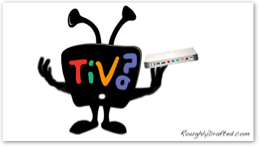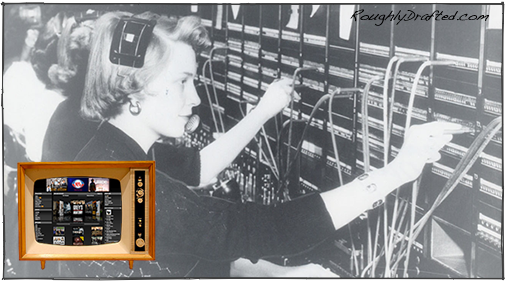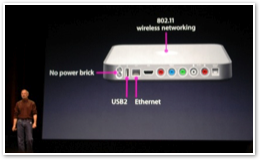
Five Ways Apple Will Change TV: 1
Why Apple Will Change TV presented similarities between the iPod and iTV, and introduced how Apple is poised to add value to existing content using the iTV in much the same way that the iPod added value to CD and MP3 music collections. Here's the first and most obvious of Five Ways Apple Will Change Your TV.
#1: On-Demand Content
It's certainly no secret that the iTV is designed to provide an audience for the movies and TV programming for sale in the iTunes Store. Apple certainly isn't the only company working to offer on-demand content, but it is pioneering Internet download sales.
Doing so requires a combination of sophisticated technology and partnerships with media content sources. Apple has proven the ability to partner with TV networks within the last year, and leads the tech world in media technology. Next to Microsoft, Apple is the only other significant media platform vendor. That puts Apple in a unique position to be able to add value for consumers in this market.
57 Channels and Nothing's On





As I mentioned in Why iTunes Works, it wasn't too long ago that the only TV programming available was whatever a few government or ad-supported networks decided to air. In the 80's, a series of cable channels, lead by HBO, emerged to provide subscribed access to premium movies without any advertising.
Since then, a broad array of cable channels have emerged to provide all types of content targeted to very specific interests, from the History Channel to Discovery, Lifetime, BET, and Comedy Central.
However, the big limitation of broadcast television is that only one program can be aired at once on a given channel. If you feel like watching something funny, and Comedy Central is playing a marathon of B movies, you're out of luck.
Broadcasters are struggling to find ways to deliver more on-demand content, but both cable and satellite systems are inherently designed to deliver the same set of content to thousands of viewers. While a single cable run or satellite dish provides a lot of bandwidth, both are currently chopped up into digitally compressed slices in order to deliver as many simultaneous channels of content as possible.
Cable and satellite providers offer this variety of content under a range of subscription pricing, just as Microsoft is trying to sell WMA subscriptions, but without any exploding content involved.
Broadcast providers are simply streaming as much content as bandwidth allows, and are fairly unconcerned with users recording or using content as they see fit.
Consumers expect to be able to time-shift programming so they can watch whatever they want at any time. What makes the Tivo so valuable to its users is its ability to hunt down and save the content they want so it is available to watch at their leisure. Without a DVR or advanced planning, broadcast TV rarely offers what users want.
The On-Demand Demand
By heavily compressing programming to fit more channels into the same data pipe, broadcast operators are trying to add value by boosting the range of variety they can offer. However, as consumers realize what is possible, their demands become increasingly sophisticated.
That's the same reason why most people buy CDs rather than just listen to the radio. There may be a broad spectrum of radio programming available for free, but people want specific content. With CDs, people get exactly what they want to listen to, and they are happy to pay for the privilege.
By offering a catalog of on-demand TV, short film, and movie programming, Apple is pioneering the path toward providing direct distribution of programming that users actually want, rather than just broadcasting streams of as much content as possible for users to pick through, salvage, and strip of ads using their Tivo. 

Apple is serving fresh food to order with the convenience of room service, when everyone else is serving a limited selection of cafeteria food under a hot lamp and calling it a “continental breakfast buffet.”
Apple is ahead of the game in providing on-demand content over the Internet, with a huge lead in developing the media technology, the delivery technology, and the store technology needed to participate in this market. I’ve written about Apple’s media technology before.
The Technical Challenge of Delivery
Serving direct content over the Internet is complex and technically challenging. Apple has been fine tuning direct Internet distribution for years, and has developed both the technology and expertise in managing bandwidth to very wide audiences.
The company first honed its skills by offering free movie trailers at increasingly higher quality levels, then in offering music downloads, TV, and now in streaming 'near DVD' quality movies.
Competitors in Internet delivery are simply struggling to offer the same end user experience because they lack the combination of technology and product finish that Apple has polished over the last decade. There's more to a movie store than simply taking money and delivering a video download.
Look What’s in Store
Apple has built iTunes into a sophisticated, full featured store using their own WebObjects platform. The iTS behaves like a normal desktop application, not like a web page at the mercy of browser incompatibilities and suffering from the inherent limitations of display HTML.
Sun and others talked a lot about how Java clients were going to change the computing landscape, but what other company has delivered a functional web services application that provides the solid, customer friendly features of a desktop application with the dynamic catalog of a live web page?
Most web merchants have to rely on basic web browsers to showcase their products. Test drive some movie previews at Amazon Unbox in comparison to the iTunes Store. Apple has a definite advantage of delivering a much nicer experience because it doesn't have to deal with the frail nature of web browsers and the various hacks around the inherently stateless protocol of HTTP.
Left to Their Own Devices
Mozilla Firefox is a hero to open source; it's a significant accomplishment in delivering an alternative to the entrenched Internet Explorer web browser that comes preinstalled on every Windows box. Plenty of web 2.0 applications also get lots of press for their buzzworthiness, but nobody has even noticed that iTunes represents the entire product category of dynamic media browsers with integrated web services. 

iTunes works so well that nobody even considers the sophisticated lead Apple has in building a music and media platform which, like Firefox, individuals have chosen to download. Whether they are using iTunes simply to catalog their existing collection, to manage their iPod, or to buy content, a huge swath of both Mac and PC users have chosen iTunes and voluntarily downloaded it.
In fact, millions of people have downloaded iTunes 7 in the last few weeks, while only a relatively tiny number (if any) have found it on their machines as the installed default. Apple has the market share of Internet Explorer but has been chosen by consumers in the style of Firefox. Imagine trying to develop a better integrated product than iTunes, then try to imagine getting as many people in the marketplace to choose to download it. Inconceivable!
The Added Value
Apple’s media, delivery, and store technology are all factors that demonstrate the company’s lead in providing on-demand content. The content is already there in the archives of movie studios and TV networks; the challenge, the value to be added, is finding a way to get it to consumers at a sustainable profit.
Of course, Apple’s already doing that, and it’s announced the iTV as a roadmap of its future plans.
But that's only the first of five areas of content where Apple can deliver value to consumers. Stay tuned for the second reason Apple will change TV in ways nobody else has been able.
This Series










Sunday, October 1, 2006


 Bookmark on Del.icio.us
Bookmark on Del.icio.us Discuss on Reddit
Discuss on Reddit Critically review on NewsTrust
Critically review on NewsTrust Forward to Friends
Forward to Friends
 Get RSS Feed
Get RSS Feed Download RSS Widget
Download RSS Widget





